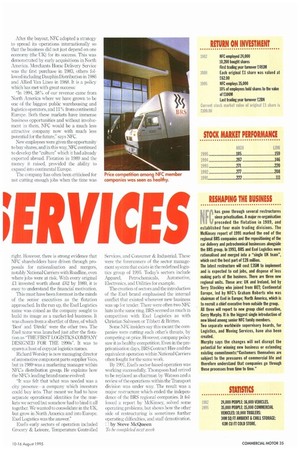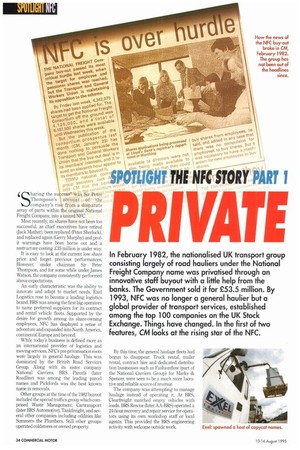;ER VICES
Page 37

Page 36

If you've noticed an error in this article please click here to report it so we can fix it.
In February 1982, the nationalised UK transport group consisting largely of road hauliers under the National Freight Company name was privatised through an innovative staff buyout with a little help from the banks. The Government sold it for 03.5 million. By 1993, NFC was no longer a general haulier but a global provider of transport services, established among the top 100 companies on the UK Stock Exchange. Things have changed. In the first of two features, CM looks at the rising star of the NFC.
. .
Thompson's atoun • qtecretary b grout) ty.„ . sharing haring the su cte I. szO°1d st,CM6.;;i‘r Peter company's ris from a disparate array of parts within the original National Freight Company, into a united NFC.
Most recently, its shares have not been too successful, as chief executives have retired (tack Mather), been replaced (Peter Sherlock), and replaced again (Gerry Murphy) and profit warnings have been borne out and a restructure costing £35 million is under way.
It is easy to look at the current low share price and forget previous performances. However, under chairman Sir Peter Thompson, and for some while under James Watson, the company consistently performed above expectations.
An early characteristic was the ability to innovate and adapt to market needs. Exel Logistics rose to become a leading logistics brand. BRS was among the first big operators to name preferred suppliers for its contract and rental vehicle fleets. Supported by the desire for growth among its share-owning employees, NFC has displayed a sense of adventure and expanded into North America, continental Europe and beyond.
While today's business is defined more as an international provider of logistics and moving services, NFC's pre-privatisation roots were largely in general haulage. This was dominated by the British Road Services Group. Along with its sister company National Carriers, BRS Parcels (later Roadline) was among the leading parcel names and Pickfords was the best known name in removals.
Other groups at the time of the 1982 buyout included the special traffics group which comprised Waste Management, Cartransport (later BRS Automotive), Tankfreight, and several other companies including oddities like Summers the Plumbers. Still other groups operated coldstores or owned property.
By this time, the general haulage fleets had begun to disappear. Truck rental, trailer rental, contract hire and dedicated distribution businesses such as Fashionflow (part of the National Carriers Group) for Marks & Spencer, were seen to be a much more lucrative and reliable source of revenue.
The company was attempting to manage haulage instead of operating it. At BRS, Clearfreight matched empty vehicles with loads. BRS Rescue (later AA-BRS) operated a 24-hour recovery and repair service for operators using its own workshop staff or local agents. This provided the BRS engineering activity with welcome outside work. After the buyout, NFC adopted a strategy to spread its operations internationally so that the business did not just depend on one economy (the UK) for its success. This was demonstrated by early acquisitions in North America. Merchants Home Delivery Service was the first purchase in 1983, others followed including Dauphin Distribution in 1986 and Allied Van Lines in 1988. It is a policy which has met with great success: "In 1994, 38% of our revenue came from North America where we have grown to be one of the biggest public warehousing and logistics operators, and 11% from continental Europe. Both these markets have immense business opportunities and without involvement in them, NFC would be a much less attractive company now with much less potential for the future," says NFC.
New employees were given the opportunity to buy shares, and in this way, NFC continued to develop the "culture" which it had already exported abroad. Flotation in 1989 and the money it raised, provided the ability to expand into continental Europe.
The company has often been criticised for not cutting enough jobs when the time was right However, there is strong evidence that NFC shareholders have driven through proposals for rationalisation and mergers, notably National Carriers with Roadline, even where jobs were at risk. With every original 11 invested worth about 162 by 1989, it is easy to understand the financial motivation.
This must have been foremost in the minds of the senior executives as the flotation approached. In the run up, the Exel Logistics name was coined as the company sought to build its image as a market-led business. It was chosen from a shortlist of three, of which 'Best' and Direke were the other two. The Exel name was launched just after the flotation as "THE FIRST LOGISTICS COMPANY DESIGNED FOR THE 1990s". It was to spawn a host, of copycat logistics names.
Richard Worsley is now managing director of automotive component parts supplier Veco, but in 1989 was a marketing manager within NEC's distribution group. He explains how the NFC's leading brand name evolved: "It was felt that what was needed was a city presence • •-a company which investors could buy into. That meant we had to have separate operational identities for the rnarkets we served but somehow had to bind it all together. We wanted to consolidate in the UK, but grow in North America and into Europe. Exel Logistics was the answer."
Exel's early sectors of operation included Grocery & Leisure, Temperature Controlled
Services, and Consumer 8,z Industrial. These were the forerunners of the sector management system that exists in the redefined logistics group of 1995. Today's sectors include Apparel, Petrochemicals, Automotive, Electronics, and Utilities for example.
The creation of sectors and the introduction of the Exel brand emphasised the internal conflict that existed whenever new business was up for tender. There were often two NEC hats in the same ring. BRS seemed as much in competition with Exel Logistics as with Christian Salvesen or Tibbett & Britten.
Some NEC insiders say this meant the companies were cutting each other's throats, by competing on price. However, company policy saw it as healthy competition. Even in the preprivatisation clays, BRS Contract Hire and the equivalent operation within National Carriers often fought for the same work,
By 1991, Exel's sector-based operation was working successfully. Thompson had retired to be replaced as chairman by Watson and a review of the operations within the Transport division was under way. The result was a major restructure which ended the independence of the BRS regional companies. It followed a report by McKinsey, solved some operating problems, but shows how the other side of restructuring is sometimes further operating difficulties, and staff demotivation. [ I by Steve McQueen To be completed next week




























































































